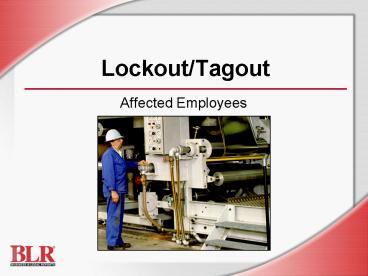Lockout/Tagout - PowerPoint PPT Presentation
1 / 23
Title:
Lockout/Tagout
Description:
Affected Employees Session Objectives You will be able to: Recognize hazardous energy sources Carry out your responsibilities related to lockout/tagout Understand the ... – PowerPoint PPT presentation
Number of Views:110
Avg rating:3.0/5.0
Title: Lockout/Tagout
1
Lockout/Tagout
- Affected Employees
2
Session Objectives
- You will be able to
- Recognize hazardous energy sources
- Carry out your responsibilities related to
lockout/tagout - Understand the purpose and use of energy control
devices and procedures
3
What You Need to Know
- What hazardous energy is and how it is controlled
- OSHAs lockout/tagout regulations
- Your responsibilities during and after
lockout/tagout - Managements responsibilities
- Lockout/tagout devices and procedures
4
What Is Hazardous Energy?
- Live or stored electricity
- Moving machine or equipment parts
- Often invisible
5
What Is Hazardous Energy? (cont.)
- Stored energy in equipment
- Heat
- Gravity
- Pneumatic, hydraulic, air and water pressure
- Steam
- Chemical
6
Hazardous Energy Injuries
- Thousands of injuries every year
- 80 of workers fail to turn off equipment
- Causes
- Unexpected start-up
- Release of stored energy
- Failure to lock/tag out
Image Credit State of WA-WISHA Services
7
Controlling Hazardous Energy
- Lockout
- Prevents machinery or equipment from being turned
on (lockout device) - Prevents machinery or equipment parts from moving
(lockout device) - Provides a warning (tagout device)
8
Lockout/Tagout Training
- Authorized employee who services machinery
- Affected employee who operates machinery
- Other employee who works near machinery
9
Your Responsibilities Related to Lockout/Tagout
- Notify maintenance when equipment needs service
or repair - Leave all lockout/tagout devices in place
- Await instructions before using equipment
- Verify equipment is safe to operate following
lockout/tagout - Follow all safety rules while operating equipment
10
Managements Responsibilities
- Ensure de-energization of equipment
- Ensure employee awareness
- Provide appropriate levels of training
- Review program effectiveness
- Maintain and revise the lockout/tagout program
- Administer appropriate discipline for violations
11
Recognize and Control Hazardous Energy
- Do you understand the information presented so
far?
12
Energy Isolation Device
- Isolate the equipment from the energy source
- Isolation device
- Circuit breaker
- Pressure valve
- Machine block
13
Lockout Device
- Lock
- Block
- Chain
- Multilock hasp
- Wheel valve cover
- Ball valve cover
14
Tagout Device
- Warning device only
- Readable
- Attached securely
- Resistant to degradation
- Removed only by an authorized employee
15
Requirements for Lockout/Tagout Devices
- Lockout/tagout devices must be
- Durable
- Standardized
- Substantial
- Identifiable
Image Credit State of WA-WISHA Services
16
Typical Equipment Requiring Lockout/Tagout
- Presses
- Power saws
- Conveyors
- Pumps
- Production equipment
- Trash compactors
17
When Lockout/Tagout Devices Must Be Used
- Servicing or maintaining machinery or equipment
- Hazardous energy exists
- Unexpected start-up could occur
18
Actions That Trigger Lockout/Tagout
- Removing or bypassing a safety device
- Any part of the body is placed in harms way
- Exposure to hazardous energy
19
Lockout/Tagout Exceptions
- Work where the potential for hazardous energy
does not exist - Activities performed during routine production
processes - Work on cord-controlled devices
- Hot tap operations where shutdown is not feasible
Image Credit State of WA-WISHA Services
20
Lockout/Tagout Procedure
- Authorized employee will
- Notify affected employees
- Shut down energized equipment
- Isolate energy sources from equipment
- Lock out or tag out the energy isolation device
- Release stored energy
- Test
21
Restart Procedure
- Authorized employee will
- Clean up and inspect work area
- Clear personnel from start-up area and notify
affected employees of start-up - Remove lockout devices or tags and reenergize
machinery or equipment - Restart equipment
22
Lockout/Tagout Devices and Procedures
- Do you understand the information presented in
the previous slides?
23
Key Points to Remember
- Hazardous energy is dangerous and deadly
- Lockout/tagout is used whenever unexpected
start-up or stored energy release could occur - Be sure to leave all lockout/tagout devices in
place and wait for instructions before using
equipment - Verify that equipment is safe to operate
following lockout/tagout































